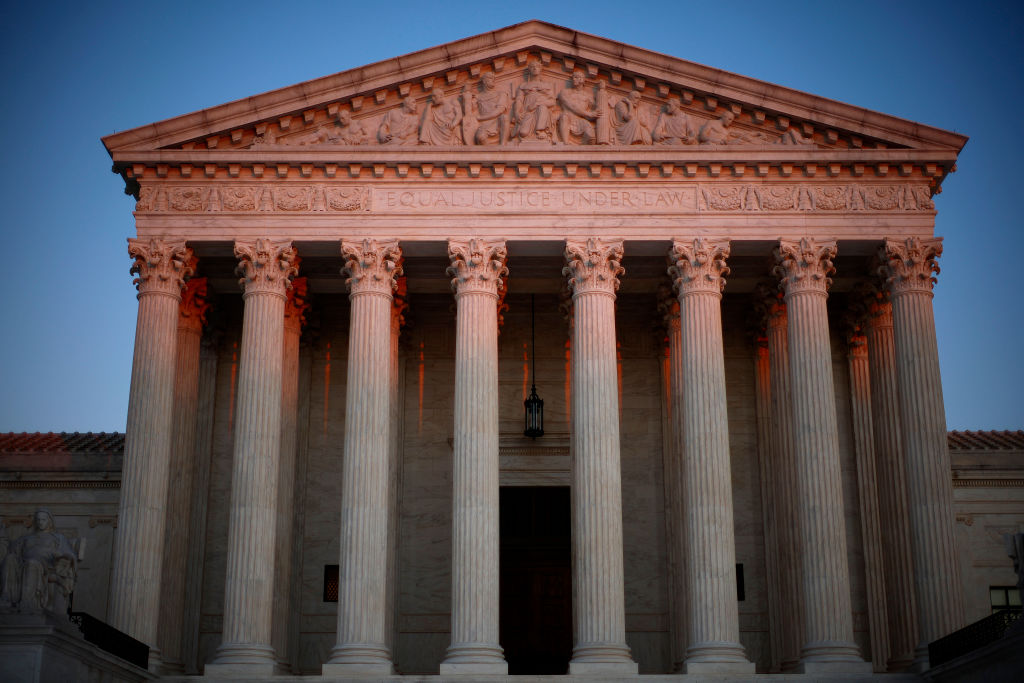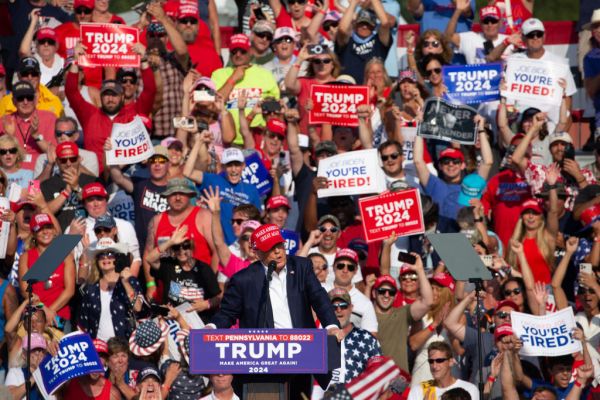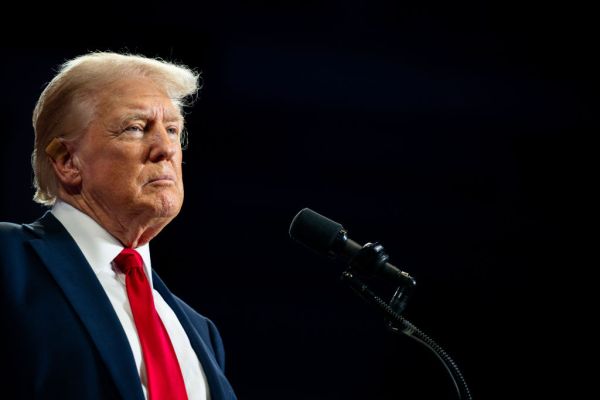“Horseshoe theory” describes the phenomenon in which political extremes on each side may converge on similar views. Some time over the next year, we can expect to see former president Donald Trump converge with zealous progressives on a now-familiar theme: The Supreme Court is a corrupt and even illegitimate body, and no particular respect is owed to its rulings.
Calling a judicial institution illegitimate implies something far beyond merely that it arrives at bad rulings, is poorly administered, or includes some officeholders who fail to live up to their duties. “The term signifies something absolutely without foundation and perhaps ultra vires,” a Harvard Law Review author noted recently. “So when a government institution or organization lacks legitimacy, it may no longer be worthy of respect or obedience.”
That makes it significant how many prominent progressives—including senators, leading law professors, and former Attorney General Eric Holder—have called the high court’s legitimacy into question.
And where respectable commentators have been willing to go, we should not be surprised to find informal popular influencers joining them. Zack Beauchamp, writing from the left in Vox, and Charles Sykes, from the center-right in The Bulwark, have rounded up examples, from columnists to ex-officials.
Beauchamp and Sykes go on to make a vital point: Progressives intent on tearing down public confidence in the court should be careful what they wish for. They will be giving what Sykes calls an “invaluable gift” to Donald Trump—a figure they can hardly wish to benefit—if they succeed. Trump may face court rulings that will in all likelihood cause him to unleash unprecedented fury—and the fury of his followers—on the judiciary personally.
As legal scholar Orin Kerr once put it, Trump’s “signature move is to attack the legitimacy of everyone and every institution who is not in lockstep with him.”
While in the past that has included judges, the ex-president has also exercised a certain shrewd discretion about which judges to attack.
When Judge Gonzalo Curiel was presiding over Trump University’s civil fraud case in federal court in the Southern District of California in 2016, Trump went to Curiel’s home turf (and the scene of the jury pool) to address a convention center in San Diego full of his followers. As I wrote then:
In his rambling remarks, Trump also referred to Judge Curiel as “Mexican”: the jurist, previously the chief federal prosecutor for drug cases in southern California, was born in Indiana. Stoking by repetition, as his crowd of thousands booed, Trump called the federal judge “a hater of Donald Trump, a hater. He’s a hater,” and said he should be placed under investigation by the court system.
The next year, then-President Trump assailed federal judge James Robart of the Western District of Washington as a “so-called judge” after Robart issued a temporary restraining order momentarily barring enforcement of a Trump executive order on visas and border crossing. Legal scholar William Baude wrote that “to call him a ‘so-called’ judge is to hint that he is not really a judge, that he lacks judicial power. It is just a hint, but it flirts with a deadly serious issue.”
Trump used Truth Social to assail New York judge Arthur Engeron, who has presided in New York Attorney General Letitia James’ civil case charging fraud and misrepresentation at the Trump Organization and by Trump family members. Trump called him “a vicious, biased, and mean ‘rubber stamp’ for the Communist takeover” of Trump’s enterprise. And this May, Trump wrote of federal district judge Lewis Kaplan, who has presided over E. Jean Carroll’s sexual assault suit against Trump, that Kaplan “is a terrible person, completely biased” who “hated [Trump] more than is humanly possible.”
Trump’s recent indictment on charges related to his conduct after the 2020 election was assigned to federal district judge Tanya Chutkan in Washington, D.C. Trump soon began using his Truth Social account to assail Chutkan as biased and subject to conflict of interest, demand that she recuse herself, and suggest doubt as to whether her assignment to the case had been random.
Although Trump has been uninhibited in going after federal district judges, he has been more circumspect thus far in getting personal about Supreme Court judges. He did muse publicly that Justices Ruth Bader Ginsburg and Sonia Sotomayor should recuse themselves from cases involving him while he was in office, though he never tried to turn this into an actual motion. By and large, however, he has spared Supreme Court justices his full-strength brand of viciousness, even while suffering a virtually unbroken string of setbacks at the high court. The court, for example, stood firm against his attempts to overturn the 2020 election and later gave approval to some congressional subpoena powers aimed at his White House papers and accounting records.
There are at least three plausible reasons for him to have gone easy before now.
One is that he himself appointed three of the nine sitting justices. Justices Neil Gorsuch, Brett Kavanaugh, and Amy Coney Barrett have, nonetheless, consistently ruled against Trump’s personal interests. Coining nasty nicknames for them might raise questions about his judgment in nominating them or risk alienating conservative followers who see his judge-picking as one of the strongest parts of his record.
A second reason is that the decisions haven’t been close. Many have been unanimous and others 7-2 or 8-1, with Justices Clarence Thomas and Samuel Alito at times accepting some of his lawyers’ arguments. That leaves less prospect of singling out one or two justices to shame as defectors, sellouts, or Judases.
And the third reason is the most basic: Trump has had every reason to regard the nine justices as repeat players before whom he is likely to appear again in future matters. There are 678 federal district judges, and Trump might reasonably expect a Judge Curiel or Judge Robart will never again preside over a case vital to him. (It’s not quite as safe to assume that about Judge Chatkan, given that federal district judges in Washington hear a disproportionate share of important cases.)
But that calculus could change rapidly in the next year, as Trump confronts federal criminal charges. Amid unprecedented stakes, Trump could easily shift toward feeling he has little left to lose; if he can’t apply the needed pressure, the whole game may be over. For one, two, or all three of his own appointees to betray him (as he would present it) on the issue of whether he should even be walking free would be far harder for him to overlook than their strayings up to now.
Berating justices by name over proceedings that don’t go his way would be just the start.
It is hardly by chance that after his arraignment, Trump chose an ambiguous, plausibly deniable wording (“If you go after me, I’m coming after you!”) suggesting that those responsible would face frightful, unpredictable (but not too specific!) consequences.
Trump knows full well the effect his incantatory denunciations have on followers. Even without his years of firsthand experience as a demagogue, he could observe how street mobilization in the aftermath of the Dobbs decision had done much to bring the justices’ physical safety into question, with polite progressive opinion seemingly divided on the question of whether demonstrations targeting the justices’ private residences were to be smiled at as healthy or not, even after the security risks had become disturbingly clear in an incident at Brett Kavanaugh’s house.
Cloaked (or not-so-cloaked) suggestions of street action aside, Trump has many ways to undercut the legitimacy of rulings against him. By simply never conceding basic truths about his conduct, even after cases are over, he implicitly challenges the courts’ role in establishing legal facts. Having taken to vilifying prosecutor Jack Smith on a near-daily basis, Trump recently amplified a call to prosecute his prosecutors themselves, and few will be surprised if, face-to-face with an actual conviction, he adds a call to prosecute the judges.
What about ignoring or defying court orders, especially if (let’s say) he can hope to run out the clock and take office as president in January 2025? As Beauchamp points out, during his successful campaign last year freshman Sen. J.D. Vance openly proposed ignoring some court rulings that might block a Trump 2.0 agenda:
I think that what Trump should do, if I was giving him one piece of advice: Fire every single midlevel bureaucrat, every civil servant in the administrative state, replace them with our people. And when the courts stop you, stand before the country, and say “The chief justice has made his ruling. Now let him enforce it.”
Vance is of course referring to the legendary and perhaps apocryphal words of President Andrew Jackson in refusing to accept the Supreme Court’s 1832 ruling in favor of Cherokee land rights in Georgia. Once again, we’ve heard plenty of corresponding chatter on the left about how it actually is or would be a good thing for the Biden administration to defy Supreme Court rulings on the eviction moratorium, student loan forgiveness, abortion, or whatever the issue may be.
Beauchamp points out that a delegitimized court could have trouble playing the vital role of settling the 2024 election in the public mind if the results are close, especially if the decision turns on legal issues, such as voting or tabulating procedures, that have themselves been contested between the parties (and most especially if the court splits along perceived partisan lines). If the court rules in favor of the propositions advanced by Republicans, “There is a very real chance that large numbers of Democrats do not accept the ruling as legitimate or even binding, regardless of the merits.” And of course in the reverse scenario, Beauchamp writes:
Trump and his allies will almost certainly claim the Court has been corrupted — and will likely persuade most Republican partisans. Think about the way Trump has turned against staunch Republican officials, like Georgia Gov. Brian Kemp and Secretary of State Brad Raffensperger, who had the temerity to accurately conclude that the 2020 election was on the level….
If any major faction rejects a Court ruling in the way that Jackson rejected [the Cherokee rights ruling], we will be thrust into a constitutional crisis. That’s a recipe for instability, even outright civil violence — something we all now know to be a real possibility.
While I’m not on board with all of Beauchamp’s analysis, I think he’s absolutely right in the conclusion he reaches: “You’ll miss Court legitimacy when it’s gone.”








Please note that we at The Dispatch hold ourselves, our work, and our commenters to a higher standard than other places on the internet. We welcome comments that foster genuine debate or discussion—including comments critical of us or our work—but responses that include ad hominem attacks on fellow Dispatch members or are intended to stoke fear and anger may be moderated.